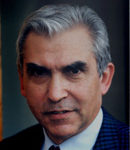
Some weeks ago, a group of the world’s top politicians, whose opinions are decisive for the world’s security, gathered in the Bayerischer Hof hotel. For the first time in 50 years―it was their jubilee meeting in Munich―the “Ukrainian issue” took centre stage with the Middle East, the Israeli-Palestinian conflict, Syria and Iran. The President of the European Council Herman van Rompuy and NATO Secretary General Anders Fogh Rasmussen talked about the issue, so did Americans and Russians, Germans and Poles. And Ukrainians.
Listening to them, I realised that the Ukrainian nation and the people who have been protesting in Kiev’s Independence Square for many months are far more mature and responsible than the Ukraine’s political class. This class has no class. The political crisis and economic breakdown have not stopped President Yanukovych from going to the Olympic Games in Sochi. The opposition cannot find a common language. No Havel or Walesa has emerged from its ranks.
Only Ukrainians can determine Ukraine’s destiny. But it was Professor Zbigniew Brzezinski who got to the bottom of the problem in Munich: “Today, Ukraine needs a compromise”. And needs it urgently. Time does not act to anyone’s advantage. If Ukrainian leaders do not want to realise this, things may get from bad to worse. The democratic opposition in Kiev needs a figure like Tadeusz Mazowiecki and Bronislaw Geremek, Jacek Kuron and Karol Modzelewski of Poland.
The outside world can help. It can provide an umbrella and a framework conducive to searching for a constructive way out of the crisis. In what way?
In this context, we should draw lessons from events that happened 20 years ago. In 1994, two tripartite agreements were signed: the US, Russia and Ukraine reached a settlement in Moscow on 15 January, while on 5 December, the US, Russia and the UK signed a Memorandum on Security Assurances on the sidelines of the Conference on Security and Co-operation in Europe. At that time, the three nuclear powers agreed to respect “the Independence and Sovereignty and the existing borders of Ukraine”. Second, they solemnly reaffirmed “their obligation to refrain from the threat or use of force against the territorial integrity or political independence of Ukraine.” Finally, they committed themselves that, pursuant to the Helsinki Final Act, they will “refrain from economic coercion designed to subordinate to their own interest the exercise by Ukraine of the rights inherent in its sovereignty and thus to secure advantages of any kind.” The three countries undertook to act in such a way that their advantages do not prejudice Ukraine in any way. No more and no less.
Today, the situation calls for these commitments to be fulfilled. Some Russian politicians scare us with Ukraine’s disintegration. We hear suggestions that Crimea and eastern provinces should proclaim their secession and be incorporated into the Russian Federation. The assurances made 20 years ago were formulated in the context of Ukraine’s denuclearisation and giving up its nuclear weapons. Today, let us consider the implementation of these commitments in the context of the transformation process and democratic changes taking place in Ukraine.
The time is ripe to call a conference of the Friends of Ukraine under the auspices of the Organization for Security and Co-operation in Europe. Its participants – acting together in a neutral and supportive way – could sit down and urgently draft a road map that would lead Ukraine out of its current crisis. It will not be a zero-sum game: either-or: a choice between the European Union and a Customs Union with Russia. One option does not necessarily have to exclude the other.
By chance, Switzerland is currently chairing the OSCE. Its experience and status of permanent neutrality might prove useful for Ukraine and the OSCE itself. Many times the Organisation has played a key role in seeking a way out of apparently hopeless situations. A meeting of the Friends of Ukraine can open a window of opportunity for Ukraine’s problems to be resolved. Let us not waste this opportunity.
————
This article was first published in the Polish newspaper Gazeta Wyborcza on 8-9 February 2014.
The opinions articulated above represent the views of the author(s), and do not necessarily reflect the position of the European Leadership Network or any of its members. The ELN’s aim is to encourage debates that will help develop Europe’s capacity to address the pressing foreign, defence, and security challenges of our time.

